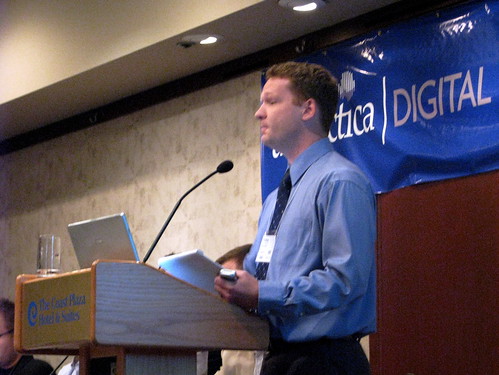IMC: Tool Demos and More Panel Goodness
Continuing my live blog coverage of the International Internet Marketing Association’s conference, the IMC, we’re now onto tool demos.
First up is the SEO Browser, developed by two Calgary companies, which helps you optimize your website for search engines. Jeff Nelson of Anduro is presenting. Simply go to SEO Browser, enter the URL of a page, and you’ll see the search engine results.

Jeff first enters a site and the SEO Browser hardly picks up a thing. The reason being, the sample website is mostly flash and images – which is NOT good for search engine optimization. [Editor’s note: Yes, you need text! If I see one more image with text in it on a site that’s trying to be optimized I’ll go nuts – that, and it looks really bad.]
I just typed in my site and you can see this live blog in the results, meaning Google is capturing all of this – which is a very good thing.
You can also see some stats, the style sheet, how many pages are listed in Google, and for my results, you could still see all of the page links and sidebar information. It also uses Google shortcuts to optimize search results (see shortcut cheatsheet or some favourites shortcut options).
Update: Up next is HubSpot’s Website Grader, presented by Erin Colbert. She’ll be using this conference’s website as an example.
 Results include: On-Page SEO, Off-Page SEO, Blogosphere, Social Mediasphere, Competitive Intelligence, Report Link. Just browsing their website they also have a badge you can display on your site to show off your score.
Results include: On-Page SEO, Off-Page SEO, Blogosphere, Social Mediasphere, Competitive Intelligence, Report Link. Just browsing their website they also have a badge you can display on your site to show off your score.
My score includes… “Google Indexed Pages: 2,520”, “Too Many Images Found!”, “Your website has an Alexa rank of 191,375 which is in the top 0.62 % of all websites”, “This blog currently has a Technorati rank of 15,021, which puts it in the top 0.02% of blogs tracked by Technorati”, “del.icio.us bookmarks: 68”. But enough of the vain searches (or those that turn out well and make me wonder why I’m not making more money off my site)…

Update: ProtoShare is up next, presented by Blake D. Johnson of Site9. “It’s how you quickly build and refine clickable, working website prototypes, with real-time collaboration. It’s how you get your clients actively involved at an early stage.” It’s like mixing up a wiki with a WordPress dashboard. You can have discussions online about header placement, where images should go, uploading files, and all elements of design.
Even though the builder/collaborator is wysiwyg you can still add/edit style sheets and there are drag ‘n drop elements as well.
The morning sessions are done so it’s time for lunch. The Coast seems to be cooking up some great buffets so far (and the croissant at breakfast just wasn’t enough) so I’m really looking forward to it.
Update: 12:47 – Just getting ready to live blog the next set of panels. I’m going for Track 1 – Search Engine Optimization.
Panelists: Alexandre Brabant of eMarketing101.ca, Omar Al-Hajjar of Magnet Search Marketing, Ellerton Whitney of Earthbound Media Group, Gary R. Beal of Stickyeyes, Lyn Wilson with 6S Marketing, and Bill Barnes, Enquiro. Rodney from Reachd will be the moderator.
Gary Beal (whose blog can be found here) starts off and comments that Google webmaster is a great starting point for SEO diagnostics. Duane had a post up about it a few months ago (and there’s a WordPress plugin) so I’ve been using it for a while now.
Bill Barnes says the biggest mistake people make is looking for the next big thing. There are so many basics that people need to grasp and apply first ie. URL structure, before taking any bigger steps. Bill is a strong supporter of having a good, solid website with great content and achieving great search engine results organically through that backbone.
Before the panel started we were all given a handout which this one contains “12 SEO Tips for 2008” from Stickyeye (although no matter how helpful, the image on their website is slightly disturbing).
A few of the tips that stand out to me are:
Ellerton reaffirms the general sentiment of the panel which is, “content is king” – and that actually makes me really happy. Sure, use all of these tools and tips to optimize your site (optimize being the word of the day) but still need to have the content that’s going to grab your audience (through search or direct referral) and have them come back day to day.
Alexandre says it’s important to be user-centric. There are so many tools and so much online help that is free, it’s not hard to take a few steps to become more searchable. “Stick with the basics!”
Omar mentions that the top three search marketing trends are “PPC” pr0n, pills, and casinos. Link farms, paid search, and other services may not add value to your content or website although they may string in different types of traffic.
Question from the audience: Does the URL really matter? ie. clean URLs or having .aspx or .html?
Answer from the panel: If you have these keywords in your URL they’re going to be highlighted, especially in a “PPC” market (now that’s Pay Per Click, not… the other PPC mentioned earlier). Another answer from the panel: Absolutely you should have keyword-rich URLs, it’s been proven over and over again that it helps so much.
Having an internal search function is a good way to find out what keywords are searching when people are already on your site.
They have now collected websites submitted by attendees and will discuss their mission, SEO, and offer tips from the panel. The first sample site from the audience is Araxis, and Alexandre notes immediately that the title tags for the links on the side should be more precise. They also note that you can’t really tell what the company does – someone from the audience says they can’t spot a single instance of the word “software” anywhere. Rodney says you need to make Google’s job easier.
Apparently there are some frustrated marketers in the room who are trying to get their message out but feel backlash from other levels of their organization. It seems pretty clear however, you need to get the right words on your site and make it searchable otherwise people won’t be able to find it.
The Drum Cafe is up next and Rodney opens up the “view page source” to spot a few errors and things that could be tweaked.
Monique submitted an example and asks – since the panel also mentioned finding the right CMS is key ie. WordPress, Drupal, ExpressionEngine – how do you find a liaison between an SEO expert/consultant and the IT department so that you can get the right CMS for the website in order for it to be optimized. Also, how can you find and recommend good SEO specialists? Rodney says that the marketer or person in charge of the project should stay involved, be at the meetings, and make sure things are working and being effective.
Read all of my IMC posts and view my Flickr photos












1 Comment — Comments Are Closed
[…] Link Love « older IMC: Tool Demos and More Panel Goodness […]